Related Research Articles
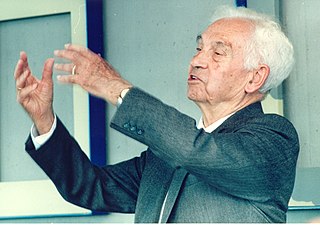
Ernst Walter Mayr was one of the 20th century's leading evolutionary biologists. He was also a renowned taxonomist, tropical explorer, ornithologist, philosopher of biology, and historian of science. His work contributed to the conceptual revolution that led to the modern evolutionary synthesis of Mendelian genetics, systematics, and Darwinian evolution, and to the development of the biological species concept.

Michael Faraday was an English scientist who contributed to the study of electromagnetism and electrochemistry. His main discoveries include the principles underlying electromagnetic induction, diamagnetism and electrolysis. Although Faraday received little formal education, he was one of the most influential scientists in history. It was by his research on the magnetic field around a conductor carrying a direct current that Faraday established the concept of the electromagnetic field in physics. Faraday also established that magnetism could affect rays of light and that there was an underlying relationship between the two phenomena. He similarly discovered the principles of electromagnetic induction, diamagnetism, and the laws of electrolysis. His inventions of electromagnetic rotary devices formed the foundation of electric motor technology, and it was largely due to his efforts that electricity became practical for use in technology.
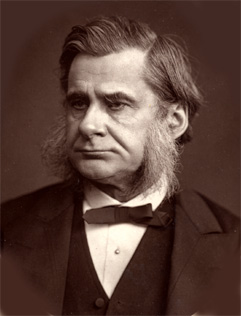
Thomas Henry Huxley was an English biologist and anthropologist who specialized in comparative anatomy. He has become known as "Darwin's Bulldog" for his advocacy of Charles Darwin's theory of evolution.

George John Romanes FRS was a Canadian-Scots evolutionary biologist and physiologist who laid the foundation of what he called comparative psychology, postulating a similarity of cognitive processes and mechanisms between humans and other animals.

James Challis FRS was an English clergyman, physicist and astronomer. Plumian Professor of Astronomy and Experimental Philosophy and the director of the Cambridge Observatory, he investigated a wide range of physical phenomena though made few lasting contributions outside astronomy. He is best remembered for his missed opportunity to discover the planet Neptune in 1846.

Sir William Huggins was a British astronomer best known for his pioneering work in astronomical spectroscopy together with his wife, Margaret.

George Ellery Hale was an American astrophysicist, best known for his discovery of magnetic fields in sunspots, and as the leader or key figure in the planning or construction of several world-leading telescopes; namely, the 40-inch refracting telescope at Yerkes Observatory, 60-inch Hale reflecting telescope at Mount Wilson Observatory, 100-inch Hooker reflecting telescope at Mount Wilson, and the 200-inch Hale reflecting telescope at Palomar Observatory. He played a key role in the foundation of the International Union for Cooperation in Solar Research and the National Research Council, and in developing the California Institute of Technology into a leading research university.

George Porter, Baron Porter of Luddenham, was a British chemist. He was awarded the Nobel Prize in Chemistry in 1967.

Agnes Mary Clerke was an Irish astronomer and writer, mainly in the field of astronomy. She was born in Skibbereen, County Cork, Ireland, and died in London.

The Cambridge Philosophical Society (CPS) is a scientific society at the University of Cambridge. It was founded in 1819. The name derives from the medieval use of the word philosophy to denote any research undertaken outside the fields of law, theology and medicine. The society was granted a royal charter by King William IV in 1832. The society is governed by an elected council of senior academics, which is chaired by the Society's President, according to a set of statutes.

The Society of Vertebrate Paleontology (SVP) is a professional organization that was founded in the United States in 1940 to advance the science of vertebrate paleontology around the world.

Margaret Lindsay, Lady Huggins, born Margaret Lindsay Murray, was an Irish-English scientific investigator and astronomer. With her husband William Huggins she was a pioneer in the field of spectroscopy and co-wrote the Atlas of Representative Stellar Spectra (1899).
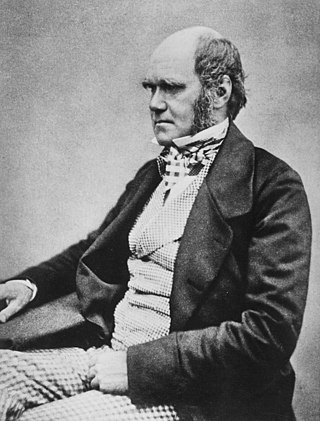
Charles Robert Darwin was an English naturalist, geologist, and biologist, widely known for his contributions to evolutionary biology. His proposition that all species of life have descended from a common ancestor is now generally accepted and considered a fundamental concept in science. In a joint publication with Alfred Russel Wallace, he introduced his scientific theory that this branching pattern of evolution resulted from a process he called natural selection, in which the struggle for existence has a similar effect to the artificial selection involved in selective breeding. Darwin has been described as one of the most influential figures in human history and was honoured by burial in Westminster Abbey.

Thomas Wharton Jones was an eminent ophthalmologist and physiologist of the 19th century.

Jameel Sadik "Jim" Al-Khalili is an Iraqi-British theoretical physicist, author and broadcaster. He is professor of theoretical physics and chair in the public engagement in science at the University of Surrey. He is a regular broadcaster and presenter of science programmes on BBC radio and television, and a frequent commentator about science in other British media.
Samuel Acton, was an English architect, surveyor and artist.

The 1860 Oxford evolution debate took place at the Oxford University Museum in Oxford, England, on 30 June 1860, seven months after the publication of Charles Darwin's On the Origin of Species. Several prominent British scientists and philosophers participated, including Thomas Henry Huxley, Bishop Samuel Wilberforce, Benjamin Brodie, Joseph Dalton Hooker and Robert FitzRoy.
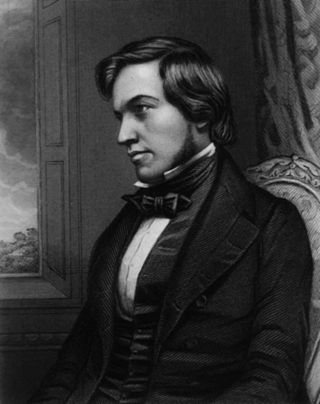
George Fownes, FRS was a British chemist.
Ralph Louis Wain CBE FRS was a British agricultural chemist.
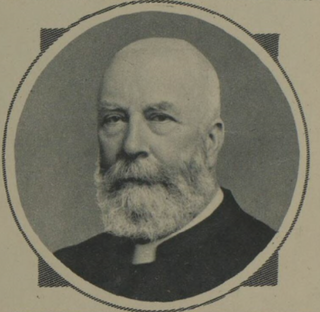
George Henslow was an Anglican curate, botanist and author. Henslow was notable for being a defender of Lamarckian evolution.
References
- ↑ - Chemistry as Exemplifies the Wisdom and Beneficence of God.
- ↑ "Notes," Nature, (Thursday, October 5, 1871) p. 453
- ↑ E.L. Youman, The Popular Science Monthly, Vol IV, 1874, p. 503
- ↑ Brück, Mary T. (2002). Agnes Mary Clerke and the Rise of Astrophysics. Cambridge University Press. p. 108. ISBN 9780521808446 . Retrieved 27 March 2012.
- 1 2 3 Benjamin Vincent, Haydn's Dictionary of Dates, 23rd ed. 1904, p. 1073
- ↑ W. H. Brock, The Selection of the Authors of the Bridgewater Treatises, Notes and Records of the Royal Society of London, Vol. 21, No. 2. (Dec., 1966), p. 177
- ↑ William Upcott, A Catalogue of the Library of the London Institution: Systematically Classed, 1852, p.417
- ↑ David H. Wells (editor), Annual of Scientific Discovery: Or, Year-book of Facts in Science and Art, for 1859, p. x
- ↑ Benjamin Vincent, A New Classified Catalogue of the Library of the Royal Institution of Great Britain, Vol II, 1882, p. 102
- ↑ "Notes," Nature, (Thursday, December 5, 1872) p. 88
- ↑ George Henslow, The Theory of the Evolution of Living Things (London: Macmillan, 1873) online at https://archive.org/details/theoryevolution00hensgoog
- ↑ Nineteenth Century Books on Evolution and Creation
- ↑ Proceedings By Royal Institution of Great Britain *1879, p. 283
- ↑ Catholic Encyclopedia
- ↑ Scientific Notes and News, Science, New Series, Vol. 12, No. 291. (Jul. 27, 1900), pp. 157
- ↑ Scientific Notes and News, Science, New Series, Vol. 25, No. 647. (May 24, 1907), p. 839.
- ↑ The Gentleman's Magazine, New Series, Vol CCCII (Jan - Jun 1907), p. 547
- ↑ Scientific Notes and News, Science, New Series, Vol. 53, No. 1364. (Feb. 18, 1921), p. 160
- ↑ Bernard Katz, "Archibald Vivian Hill," Biographical Memoirs of Fellows of the Royal Society, Vol. 24. (Nov., 1978), p. 135
- ↑ Scientific Notes and News, Science, New Series, Vol. 82, No. 2119. (Aug. 9, 1935), p. 122
- ↑ News and Notes, Science, New Series, Vol. 110, No. 2850. (Aug. 12, 1949), p. 173
- ↑ "Professor R. L. Wain", The Independent, Frank Taylor, 10 January 2001